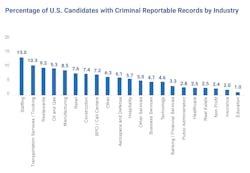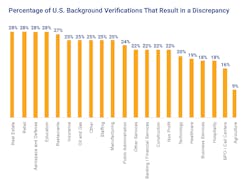Mastering the Art of Performing a Background Check
Although hiring may have slipped down the list of top priorities for electrical contractors coping with the ramifications of COVID-19 over the last year, it’s almost certain to reassert itself as the pandemic subsides and work ramps back up. In fact, recent analysis from Associated Builders and Contractors (ABC) suggests the construction industry will need to hire approximately 430,000 more craft professionals this year (read “Construction Industry Faces Hiring Boom” for more details).
When and if that happens, contractors who have reduced headcount because of cancelled, scaled back, and postponed work could encounter fresh challenges reconstituting their workforces. And those needing to staff up will have to exercise a skill that may be a little rusty: the pre-employment background check.
Here’s why this seemingly routine task may turn out to be more challenging than before. Reconnecting with laid off workers scattered over the last year by the pandemic might prove more difficult, many of whom may have since found other work or career paths. Therefore, fewer “known quantities” might be available. Then there’s the persistent industry problem of finding people who want and/or are qualified to do construction-related work — one that could be magnified if a quick upturn in business forces companies en masse into a tight labor market.
Ultimately, any large-scale push to hire a lot of workers quickly from a smaller and thinner pool could test employers’ ability to methodically vet applicants, and tempt them to take due-diligence shortcuts that could saddle them with workers who create workplace safety risks, productivity challenges, and costly turnover issues. At the same time, however, the industry’s hardening labor market challenges, only compounded by the pandemic, might require companies to re-evaluate stringent qualification criteria that could hamper their ability to hire workers in a demand-exceeds-supply market. In other words, the process of checking applicant backgrounds might be starting to look less like a science and more like an art.
Here are a few timely considerations when it comes to thinking about applicant background checks:
Re-think those lines in the sand. Ruling out applicants with any kind of criminal record might not be operative in the real world of recruiting for some types of jobs today. Evolving views of fairness and bias in the criminal justice system, particularly as they relate to drug-related and other non-violent offenses, might dictate that employers show more tolerance for applicants with criminal records that surface in post-offer background checks.
“Think about what crimes you consider to be zero-tolerance; if you’re too strict, you might find yourself in a place where it’s very hard to find someone for some jobs,” says Jared Rosenthal, CEO of Health Street, a New York-based company whose services include pre-employment background screening.
It’s a dilemma that companies in the general construction space may be particularly likely to encounter. A study by First Advantage, an Atlanta-based workforce services company, shows that in 7.4% of background checks done for companies classified as "construction" in 2020, a reportable criminal record was found (Fig. 1). Only six of 21 industry types First Advantage serves had a higher “reportable record rate.”
Drug usage is another evolving can of worms. New thinking about marijuana usage might be lessening employer concerns over convictions for simple possession. But at the same time, worries are growing over opioid usage, an issue of particular concern in construction. A recent Association General Contractors of America survey found 26% of contractors indicating it’s more difficult to find applicants who can pass a drug test.
Resist the need for speed. Should hiring pressures mount amid rising competition for workers, companies could be tempted to rush background checks and hiring decisions. Smart hiring demands careful up-front consideration of candidate qualification criteria that will be incorporated into background checks, selection of partners capable of performing timely, but thorough checks and the patience to study and evaluate the results. Employers also must be armed with a thorough understanding of employment laws that might come into play if background checks reveal information that might disqualify candidates who’ve been offered conditional employment. Acting quickly to sew up top candidates could become more important, but it shouldn’t come at the expense of fully knowing and evaluating a candidate’s qualifications.
Stay alert to qualification discrepancies. Contractors employing skilled trade workers must know applicants have the skills, training, and experience to do the work competently and safely. Incorporating credential checks and detailed employment history into background checks for these workers is essential, and employers must examine results to be certain hires are who they say they are.
Checking educational criteria, licensing, and training could become more critical as the last year’s pandemic may have disrupted employment, experience, schooling, and certifications for some applicants. Employers might have to be alert to workers eager to getting back to work as the pandemic recedes being less than forthright on qualifications. Education and employment verification discrepancies show up routinely in background checks, First Advantage data shows (Fig. 2). On average, about 23% of applicants across 21 industries had verification issues on background checks, with construction logging about a 22% rate.
Keep it professional. Doing background checks by the book and avoiding the temptation to do quick and dirty applicant Internet/social media searches, for instance, will be critical if a hiring frenzy begins. “You basically shouldn’t Google the person,” Rosenthal says. “You may find things that employment law says you can’t consider during the hiring process. Background check companies like us will often find things the company shouldn’t see, like records of arrests that don’t result in a conviction or information that conflicts with the employment provisions of the Americans With Disabilities Act. We’ll filter out that type of information.”
Zind is a freelance writer based in Lees Summit, Mo. He can be reached at [email protected].






